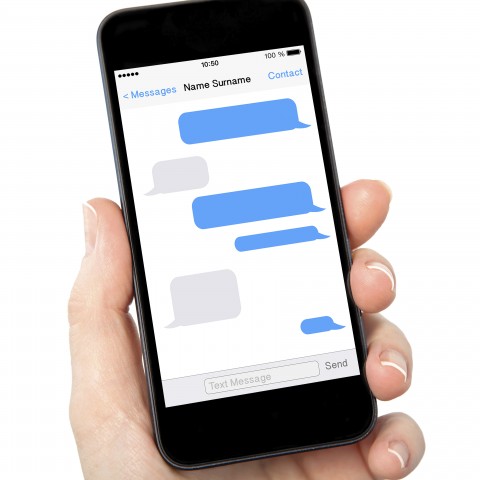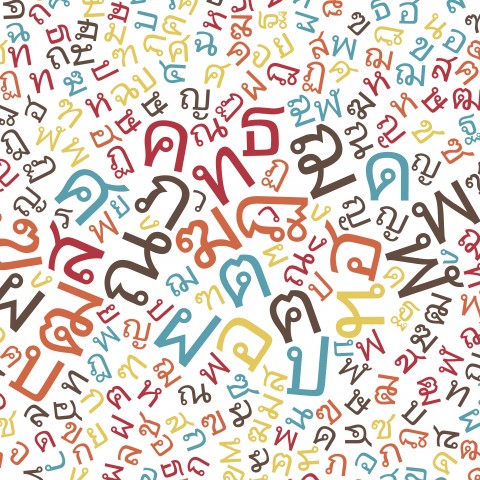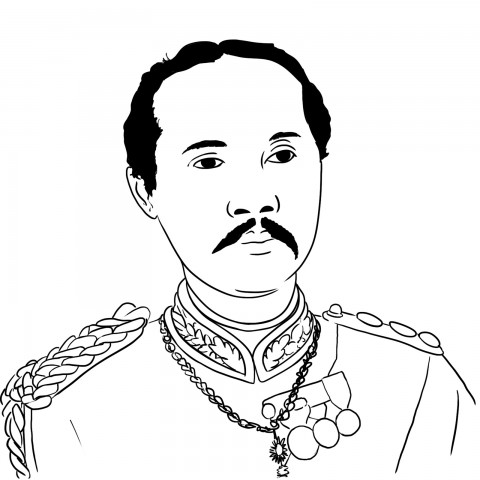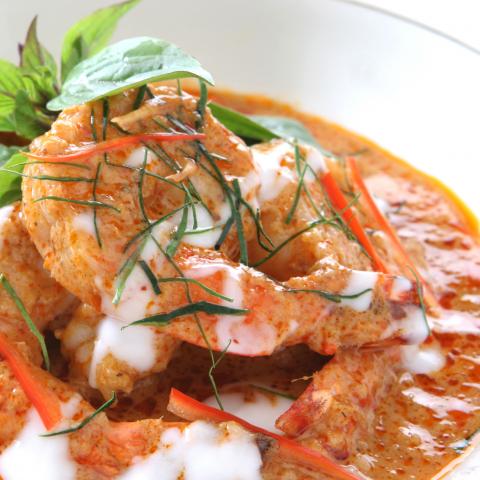
You’re learning to speak Thai, and it’s going well. Your confidence is growing! So much so that you feel ready to share your experiences on social media—in Thai.
At Learn Thai, we make this easy for you to get it right the first time. Post like a boss with these phrases and guidelines, and get to practice your Thai in the process.

1. Talking about Your Restaurant Visit in Thai
Eating out is fun, and often an experience you’d like to share. Take a pic, and start a conversation on social media in Thai. Your friend will be amazed by your language skills…and perhaps your taste in restaurants!
Win eats at a restaurant with his friends, posts an image of it, and leaves this comment:

POST
Let’s break down win’s post.
ไปทานอาหารญี่ปุ่นกับเพื่อนๆ (bpai thaan aa-hăan yîi-bpùn gàp phûuean phûuean)
“Having Japanese food with friends.”
1- ไปทานอาหารญี่ปุ่น (bpai thaan aa-hăan yîi-bpùn )
First is an expression meaning “Went to have Japanese food.”
In Thailand, Japanese food is very popular. Thai people are crazy about Japanese food, and because of this, it is common for new-generation Thais to eat out at Japanese restaurants in big shopping malls.
2- กับเพื่อนๆ (gàp phûuean phûuean)
Then comes the phrase – “With friends.”
The repetition of the word “friend” implies that there was more than one friend with him.
COMMENTS
In response, win’s friends leave some comments.
1- ไว้นัดกันอีกนะจ๊ะ (wái nát gan ìik ná já)
His high school friend, maai, uses an expression meaning – “Let’s meet again!”
Use this expression to show you are eager to repeat this meeting with friends.
2- วันนี้สนุกมากเลยเนอะ ^^ (wan-níi sà-nùk mâak looei nóe)
His girlfriend, fáa, uses an expression meaning – “Today was so fun.”
Use this expression to indicate you enjoyed the experience.
3- อาหารร้านนั้นอร่อยมากๆค่ะ (aa-hăan ráan nán a-ràauy mâak mâak khâ)
His neighbor, phraae, uses an expression meaning – “The food there is very good.”
Use this expression to compliment the food.
4- ขอบใจที่ชวนมานะ เพื่อน (khàawp-jai thîi chuuan maa ná phûuean)
His college friend, em, uses an expression meaning – “Thanks for asking me out, dude.”
Use this expression to show you are feeling grateful towards your friend for the invitation.
VOCABULARY
Find below the key vocabulary for this lesson:
อาหาร (aa-hăan): “food”
ญี่ปุ่น (yîi-bpùn): “Japan or Japanese”
นัด (nát): “make a meeting or appointment”
สนุก (sà-nùk): “have fun”
ร้าน (ráan): “shop, restaurant, store”
อร่อย (à-ràauy): “delicious”
ชวน (chuuan): “ask out or invite”
So, let’s practice a bit. If a friend posted something about having dinner with friends, which phrase would you use?
Now go visit a Thai restaurant, and wow the staff with your language skills!
2. Post about Your Mall Visit in Thai
Another super topic for social media is shopping—everybody does it, most everybody loves it, and your friends on social media are probably curious about your shopping sprees! Share these Thai phrases in posts when you visit a mall.
fáa shop with her sister at the mall, posts an image of it, and leaves this comment:

POST
Let’s break down fáa’s post.
ชอบมาช้อปปิ้งกับพี่สาวที่สุดเลย! (châawp maa cháwp-bpîng gàp phîi-săao thîi-sùt looei)
“I love shopping with my sister!”
1- ชอบมาช้อปปิ้งที่สุดเลย (châawp maa cháwp-bpîng thîi-sùt looei)
First is an expression meaning “I love to go shopping the most..”
Thai people love shopping. Clothes and goods in Thailand are relatively cheap, while the quality and designs are quite good. Moreover, it’s normal to see people selling stuff everywhere in Thailand. For example, on the street, in a shopping mall, or at a flea market.
2- กับพี่สาว (gàp phîi-săao)
Then comes the phrase – “with my sister.”
One characteristic of Thai people, especially girls, is that they love to have someone accompany them when they go out.
COMMENTS
In response, fáa’s friends leave some comments.
1- อิจฉาจัง 555 (ìt-chăa jang hâa hâa hâa)
Her high school friend, nám phŏn, uses an expression meaning – “Jealous. Lol.”
Use this expression to indicate you’re envious of the poster’s experience, but not in a nasty way.
2- ซื้อขนมมาฝากไอติมด้วย (súue khà-nŏm maa fàak ai-dtim dûuai)
Her nephew, ai-dtim, uses an expression meaning – “Buy me some snacks!”
Use this expression to make conversation by demanding something in a playful way.
3- คนเยอะมั๊ย (khon yóe mái)
Her college friend, em, uses an expression meaning – “Is it crowded?”
Use this expression to show you are curious and would like to know more about the event.
4- ตอนนี้ร้าน A ลดราคาอยู่นะจ๊ะ (dtaawn-níi ráan ee lót raa-khaa yùu ná já)
Her neighbor, phraae, uses an expression meaning – “Check out the sale in Shop A”
Use this expression when you have advice to give that could benefit the poster.
VOCABULARY
Find below the key vocabulary for this lesson:
พี่สาว (phîi-săao): “older sister”
ช้อปปิ้ง (cháwp-bpîng): “shopping”
อิจฉา (ìt-chăa): “envy or jealous”
ขนม (khà-nŏm): “snacks”
เยอะ (yóe): “a lot, many or much”
ร้าน (ráan): “shop, restaurant, store”
ลดราคา (lót raa-khaa): “give a discount”
So, if a friend posted something about going shopping, which phrase would you use?
3. Talking about a Sport Day in Thai
Sports events, whether you’re the spectator or the sports person, offer fantastic opportunities for great social media posts. Learn some handy phrases and vocabulary to start a sport-on-the-beach conversation in Thai.
win plays with his friends at the beach, posts an image of it, and leaves this comment:

POST
Let’s break down win’s post.
มาเตะบอลที่ทะเล ดำเลย (maa dtè baawn thîi thá-lee dam looei)
“Playing soccer by the sea. Now, I’m dark.”
1- มาเตะบอลที่ทะเล (maa dtè baawn thîi thá-lee )
First is an expression meaning “Playing soccer by the sea..”
The most popular sport among Thai men is soccer.
2- ดำเลย (dam looei)
Then comes the phrase – “Now, Im dark..”
Thailand has strong sunlight. So by going to the sea, even without sun-bathing yourself, you tend to get darker.
COMMENTS
In response, win’s friends leave some comments.
1- 555 (hâa hâa hâa)
His girlfriend’s high school friend, nám phŏn, uses an expression meaning – “hahaha”
Use this expression to show that you find the post humorous.
2- หรอ? ;P (rǎaw)
His college friend, em, uses an expression meaning – “Oh yeah? ;P”
Use this expression to show you are feeling frivolous and are in a teasing mood.
3- มาเล่นกับไอติมบ้างสิ (maa lêen gàp ai-dtim bâang sì)
His girlfriend’s nephew, ai-dtim, uses an expression meaning – “Come and play with me too!”
Use this expression to show you are feeling playful and inviting.
4- ดูน่าสนุกจังเลยค่ะ (duu nâa sà-nùk jang looei khâ)
His neighbor, phraae, uses an expression meaning – “Looks fun.”
Use this comment when the poster’s photo looks like a fun event.
VOCABULARY
Find below the key vocabulary for this lesson:
เตะบอล (dtè baawn): “play football”
ทะเล (thá-lee ): “sea”
ดำ (dam): “dark or black”
กับ (gàp ): “with”
เล่น (lêen): “play”
ดู (duu ): “look like, seem or deem”
น่าสนุก (nâa sà-nùk): “seem fun”
Which phrase would you use if a friend posted something about sports?
But sport is not the only thing you can play! Play some music, and share it on social media.
4. Share a Song on Social Media in Thai
Music is the language of the soul, they say. So, don’t hold back—share what touches your soul with your friends!
fáa shares a song she just heard at a party, posts an image of the artist, and leaves this comment:

POST
Let’s break down fáa’s post.
เพลงนี้โดนใจสุดๆ (phleeng níi doon-jai sùt sùt)
“I’m so loving this song.”
1- เพลงนี้ (phleeng níi )
First is an expression meaning “This song.”
Unlike in English, in Thai the word ‘this’ is placed after the noun, not in front of it.
2- โดนใจสุดๆ (doon-jai sùt sùt)
Then comes the phrase – “to my liking” or “super impressed”.
This phrase literally means ‘maximum hit to the heart’. It is used when talking about things that you really like, mostly songs, movies and books. Sometimes we use it with people, but only when referring to a person of the opposite sex that you like in a romantic way.
COMMENTS
In response, fáa’s friends leave some comments.
1- ชอบเหมือนกัน (châawp mǔuean gan)
Her boyfriend, win, uses an expression meaning – “I like it too.”
Use this expression to show you agree with the poster.
2- ชอบคนหรือชอบเพลงจ๊ะ ;P (châawp khon rǔue châawp phleeng já)
Her high school friend, nám phŏn, uses an expression meaning – “Do you like the person or the song? ;P”
Use this expression to be funny.
3- ผมก็ชอบเพลงนี้ครับ (phŏm gâaw châawp phleeng níi khráp)
Her supervisor, non, uses an expression meaning – “I like this song too.”
This is the same as above, meaning you say that you like something, specifically the song.
4- เพลงอะไรอะ ป้า -“- (phleeng à-rai à bpâa)
Her nephew, ai-dtim, uses an expression meaning – “What song is this, Aunty? -“-”
Use this expression to show you are curious about the name of the song.
VOCABULARY
Find below the key vocabulary for this lesson:
เพลง (phleeng ): “song”
นี้ (níi ): “this”
โดนใจ (doon-jai ): “to one’s liking”
ชอบ (châawp ): “like”
เหมือนกัน (mǔuean gan): “too”
คน (khon): “person or people”
อะไร (à-rai): “what”
Which song would you share? And what would you say to a friend who posted something about sharing music or videos?
Now you know how to start a conversation about a song or a video on social media!
5. Thai Social Media Comments about a Concert
Still on the theme of music—visiting live concerts and shows just have to be shared with your friends. Here are some handy phrases and vocab to wow your followers in Thai!
win goes to a concert, posts an image of himself at the concert, and leaves this comment:

POST
Let’s break down win’s post.
คอนเสิร์ตวันนี้มันส์มาก (khaawn-sòoet wan-níi man mâak)
“Today’s concert was so fun.”
1- คอนเสิร์ตวันนี้ (khaawn-sòoet wan-níi )
First is an expression meaning “Today’s concert .”
Going to concerts are one of the most popular activities that Thai people love to enjoy.
2- มันส์มาก (man mâak)
Then comes the phrase – “Was so much fun.”
This word is often used in spoken language and on social media.
COMMENTS
In response, win’s friends leave some comments.
1- คอนเสิร์ตใครน่ะ (khaawn-sòoet khrai nâ)
His college friend, em, uses an expression meaning – “Whose concert was it?”
Use this expression if you need more information.
2- น่าสนุกจังเลยค่ะ 🙂 (nâa sà-nùk jang looei khâ)
His neighbor, phraae, uses an expression meaning – “Sounds fun.”
Use this expression if you want to comment shortly but positively.
3- สนุกมั๊ย อยากไปบ้าง (sà-nùk mái yàak bpai bâang)
His high school friend, maai, uses an expression meaning – “Was it fun? I wanna go too.”
Use these phrases to show your interest in the topic, and express that you’d like to have the same experience.
4- ไม่เคยชวนเลยนะ 🙁 (mâi khooei chuuan looei ná)
His girlfriend’s nephew, ai-dtim, uses an expression meaning – “You never invited me!”
Use this expression to show you feel a bit left out.
VOCABULARY
Find below the key vocabulary for this lesson:
คอนเสิร์ต (khaawn-sòoet ): “concert”
วันนี้ (wan-níi ): “today”
มันส์ (man): “so much fun”
ใคร (khrai): “who or whose”
สนุก (sà-nùk): “fun”
อยาก (yàak): “want”
ชวน (chuuan): “ask out or invite”
If a friend posted something about a concert , which phrase would you use?
6. Talking about an Unfortunate Accident in Thai
Oh dear. You broke something by accident. Use these Thai phrases to start a thread on social media. Or maybe just to let your friends know why you are not contacting them!
fáa accidentally breaks her mobile phone, and leaves this comment:

POST
Let’s break down fáa’s post.
ทำมือถือตกแตก T T (tham muue-thǔue dtòk dtàaek)
“I dropped and broke my cell. ”
1- มือถือ (muue-thǔue)
First is an expression meaning “cell-phone.”
Nowadays, everyone in Thailand has a cellphone, and they’re addicted to social networks.
2- ทำ…ตกแตก (tham…dtòk dtàaek)
Then comes the phrase – “drop and break it.”
A phrase describing the action of dropping something and breaking it instantly.
COMMENTS
In response, fáa’s friends leave some comments.
1- ลองเอาไปให้ที่ศูนย์โทรศัพท์ดูนะ (laawng ao bpai hâi thîi sǔun thoo-rá-sàp duu ná)
Her boyfriend, win, uses an expression meaning – “Take it to the phone center.”
Use this expression to show you are feeling determined.
2- ใจเย็นๆนะคะ เดี๋ยวก็ซ่อมได้ (jai yen-yen ná khá dĭiao gâaw sâawm dâi)
Her neighbor, phraae, uses an expression meaning – “Calm down. It’ll be fixed.”
Use this expression to give advice and remind the poster that the issue is not such a big problem.
3- โห สภาพน่ากลัวมาก (hŏo sà-phâap nâa-gluua mâak)
Her college friend, em, uses an expression meaning – “OMG. It looks horrible.”
Use this expression to show you are feeling shocked by something’s appearance. In this context, it’s also expressing a sort of sympathy.
4- ถือว่าได้โอกาสเปลี่ยนเครื่องใหม่เลยไง (thǔue wâa dâi oo-gàat bplìian khrûueang mài looei ngai)
Her high school friend, nám phŏn, uses an expression meaning – “Think of it as a way to switch to a new cell.”
Use this expression to be funny and encouraging at the same time.
VOCABULARY
Find below the key vocabulary for this lesson:
มือถือ (muue-thǔue): “cellphone”
ตก (dtòk): “fall or drop “
ศูนย์โทรศัพท์ (sǔun thoo-rá-sàp): “phone center”
ซ่อม (sâawm): “repair or fix”
สภาพ (sà-phâap ): “condition”
น่ากลัว (nâa-gluua): “scary”
โอกาส (oo-gàat): “chance”
If a friend posted something about having broken something by accident, which phrase would you use?
So, now you know how to describe an accident in Thai. Well done!
7. Chat about Your Boredom on Social Media in Thai
Sometimes, we’re just bored with how life goes. And to alleviate the boredom, we write about it on social media. Add some excitement to your posts by addressing your friends and followers in Thai!
win gets bored at home, and leaves this comment:

POST
Let’s break down win’s post.
เบื่อจัง ไม่มีอะไรทำ (bùuea jang mâi mii à-rai tham)
“I’m bored. There’s nothing to do.”
1- เบื่อจัง (bùuea jang )
First is an expression meaning “I’m bored. .”
A phrase often used by Thais to express that they are bored. It’s used in spoken language and on social media.
2- ไม่มีอะไรทำ (mâi mii à-rai tham)
Then comes the phrase – “There’s nothing to do..”
Thai people normally kill time by going out to meet friends, chilling at a cafe, and/or going to a movie theatre.
COMMENTS
In response, win’s friends leave some comments.
1- เบื่อด้วย (bùuea dûuai)
His girlfriend, fáa, uses an expression meaning – “I’m bored too.”
Use this expression to show you are feeling the same as the poster.
2- 555 (hâa hâa hâa)
His girlfriend’s high school friend, nám phŏn, uses an expression meaning – “lol”
Use this expression to show that you think the post is funny. (lol stands for:”laugh out loud” )
3- ออกไปข้างนอกกัน! (àawk bpai khâang nâawk gan)
His college friend, em, uses an expression meaning – “Let’s hang out!”
Use this expression to show you are feeling helpful to alleviate the poster’s boredom.
4- ลองหาหนังสือมาอ่านดูสิ (laawng hăa năng-sǔue maa àan duu sì)
His high school friend, maai, uses an expression meaning – “Try finding a book to read.”
This is another solution to the poster’s problem of boredom, so you’ll post this when you feel helpful.
VOCABULARY
Find below the key vocabulary for this lesson:
เบื่อ (bùuea): “get bored”
ไม่มีอะไร (mâi mii à-rai): “nothing”
ด้วย (dûuai): “too or also”
ออกไป (àawk bpai ): “get out “
ข้างนอก (khâang nâawk): “outside”
หนังสือ (năng-sǔue ): “book”
อ่าน (àan): “read”
If a friend posted something about being bored, which phrase would you use?
Still bored? Share another feeling and see if you can start a conversation!
8. Exhausted? Share It on Social Media in Thai
Sitting in public transport after work, feeling like chatting online? Well, converse in Thai about your mood, and let your friends join in!
fáa feels exhausted after a long day at work, posts an image of herself looking tired, and leaves this comment:

POST
Let’s break down fáa’s post.
ทำงานเหนื่อยจัง (tham ngaan nùueai jang)
“I’m so tired from work.”
1- ทำงาน (tham ngaan )
First is an expression meaning “work..”
Office workers in Bangkok normally work at least eight hours a day. Their lives are very hectic; that’s why they always feel tired from work. Moreover, women in Thailand tend to work rather than staying home and being a housewife.
2- เหนื่อยจัง (nùueai jang)
Then comes the phrase – “I’m so tired”.
A frequently used expression on the Internet that people use to whine and complain about being tired.
COMMENTS
In response, fáa’s friends leave some comments.
1- ดูแลตัวเองด้วยนะคะ (duu-laae dtuua-eeng dûuai ná khá)
Her neighbor, phraae, uses an expression meaning – “Please, take care of yourself.”
Use this expression to show you are feeling warmhearted and caring.
2- ขอบคุณที่ตั้งใจทำงานนะครับ (khàawp-khun thîi dtâng-jai tham ngaan ná khráp)
Her supervisor, non, uses an expression meaning – “Thank you for the hard work.”
Use this phrase when you are feeling thankful.
3- ไปเที่ยวกัน! (bpai thîiao gan)
Her college friend, em, uses an expression meaning – “Let’s go out and have fun!”
Use this expression to show you are feeling frivolous and playful. It’s an invitation to go out.
4- สู้ๆนะ (sûu-sûu ná)
Her boyfriend, win, uses an expression meaning – “Fighting!”
Use this expression when you want to tell someone to hold courage and not give up the fight.
VOCABULARY
Find below the key vocabulary for this lesson:
ทำงาน (tham ngaan): “work”
เหนื่อย (nùueai): “be tired”
ดูแล (duu-laae ): “take care”
ตัวเอง (dtuua-eeng): “oneself”
ขอบคุณ (khàawp-khun): “thank you”
ไปเที่ยว (bpai thîiao ): “hang out, go out or travel”
กัน (gan): “let’s”
If a friend posted something about being exhausted, which phrase would you use?
Now you know how to say you’re exhausted in Thai! Well done.
9. Talking about an Injury in Thai
So life happens, and you manage to hurt yourself during a soccer game. Very Tweet-worthy! Here’s how to do it in Thai.
win suffers an injury, posts an image of himself in pain, and leaves this comment:

POST
Let’s break down win’s post.
โอ๊ย จะปวดอะไรนักหนา (óoi jà bpùuat à-rai nák năa)
“Ouch! Why is it so painful?”
1- โอ๊ย (óoi )
First is an expression meaning “Ouch.”
An interjection to express physical pain.
2- จะปวดอะไรนักหนา (jà bpùuat à-rai nák năa)
Then comes the phrase – “Why is it so painful?.”
In Thailand, the first thing people do when they feel pain is to take a painkiller. These are sold everywhere, even at convenience stores.
COMMENTS
In response, win’s friends leave some comments.
1- เป็นอะไรมั๊ยคะ (bpen à-rai mái khá)
His neighbor, phraae, uses an expression meaning – “Are you ok?”
Use this expression to show you are feeling concern for the poster’s wellbeing.
2- ปวดอะไร (bpùuat à-rai)
His high school friend, maai, uses an expression meaning – “What pain?”
Use this expression when you are trying to inject some humour into the situation.
3- ปวดใจ? ;P (bpùuat jai)
His girlfriend’s high school friend, nám phŏn, uses an expression meaning – “Love pain? ;P”
This phrase has the same purpose as the previous one – you’re trying to lighten up the conversation.
4- เกิดอะไรขึ้นเนี่ย (gòoet à-rai khûen nîia)
His college friend, em, uses an expression meaning – “What’s happening here?”
This is a question to extract more information from the poster.
VOCABULARY
Find below the key vocabulary for this lesson:
โอ๊ย (óoi ): “Ouch”
ปวด (bpùuat ): “feel pain”
อะไร (à-rai ): “what”
นักหนา (nák năa): “so much”
ปวดใจ (bpùuat jai): “love pain”
เกิดขึ้น (gòoet khûen ): “happen”
If a friend posted something about being injured, which phrase would you use?
We love to share our fortunes and misfortunes; somehow that makes us feel connected to others.
10. Starting a Conversation Feeling Disappointed in Thai
Sometimes things don’t go the way we planned. Share your disappointment about this with your friends!
fáa feels disappointed about today’s weather, posts an image of it, and leaves this comment:

POST
Let’s break down fáa’s post.
เกลียดฝนตก เกลียดรถติด (glìiat fŏn dtòk glìiat rót dtìt)
“Hate the rain. Hate traffic jams.”
1- เกลียดฝนตก (glìiat fŏn dtòk )
First is an expression meaning “Hate the rain. .”
When it’s not the rainy season or an unusual occurrence, e.g. a typhoon, it seldom rains in Thailand.
2- เกลียดรถติด (glìiat rót dtìt)
Then comes the phrase – “Hate traffic jams..”
When it rains, there’s a high potential for floods and massive traffic jams in big cities. That’s why Thai people always complain about the rain.
COMMENTS
In response, fáa’s friends leave some comments.
1- เซ็งเหมือนกัน (seng mǔuean gan)
Her college friend, em, uses an expression meaning – “This sucks!”
Use this expression to show you are agreeing with the poster.
2- มาบริษัท ขับรถระวังๆนะครับ (maa baaw-rí-sàt khàp rót rá-wang rá-wang ná khráp)
Her supervisor, non, uses an expression meaning – “Please be careful when you drive to the office today.”
Use this expression to show concern, almost like a parent.
3- ดูแลตัวเองด้วยนะ (duu laae dtuua eeng dûuai ná)
Her boyfriend, win, uses an expression meaning – “Please take care of yourself.”
Use this expression to show you are feeling concern for the poster’s wellbeing.
4- น่าจะตกไม่นานนะคะ (nâa jà dtòk mâi naan ná khá)
Her boyfriend’s high school friend, maai, uses an expression meaning – “Maybe it won’t last long.”
Use this expression to show you are feeling optimistic that there may be relief ahead.
VOCABULARY
Find below the key vocabulary for this lesson:
เกลียด (glìiat ): “hate”
ฝนตก (fŏn dtòk ): “rain”
รถติด (rót dtìt): “traffic jam”
เซ็ง (seng): “get bored”
บริษัท (baaw-rí-sàt ): “company or office”
ขับรถ (khàp rót): “drive”
ระวัง (rá-wang): “be careful”
How would you comment in Thai when a friend is disappointed?
Not all posts need to be about a negative feeling, though!
11. Talking about Your Relationship Status in Thai
Don’t just change your relationship status in Settings, talk about it!
win changes his status to “In a relationship”, posts an image of it, and leaves this comment:

POST
Let’s break down win’s post.
ไม่โสดแล้วครับ (mâi sòot láaeo khráp)
“I’m not single anymore.”
1- ไม่โสดแล้ว (mâi sòot láaeo)
First is an expression meaning “I’m not single anymore”.
When Thai people change their relationship status from single to in-a-relationship, friends will often post to either congratulate or tease them.
2- ครับ (khráp)
Then comes the phrase which is a particle for guys.
This is the ending particle for men to indicate formality. However, on social media, it is normally used in a joking manner, like ‘sir’ or ‘madam’ in English, which people sometimes use to tease others.
COMMENTS
In response, win’s friends leave some comments.
1- ยินดีด้วย! (yin dii dûuai )
His high school friend, maai, uses an expression meaning – “Congratulations!”
Use this expression to give congratulations.
2- ในที่สุดก็เปิดตัวนะ ;P (nai thîi sùt gâaw bpòoet-dtuua ná)
His college friend, em, uses an expression meaning – “Finally, you go public ;P”
Use this expression to show you are in a fun mood, and want to tease the poster a bit.
3- ดีใจด้วยนะคะ (dii jai dûuai ná khá)
His neighbor, phraae, uses an expression meaning – “Happy for you”
Use this expression to show you are feeling warmhearted and happy about the event.
4- แต่งเมื่อไหร่บอกด้วยนะ อิอิ (dtàaeng mûuea rài bàawk dûuai ná ì-ì)
His girlfriend’s high school friend, nám phŏn, uses an expression meaning – “When you get married, please let me know. lol.”
Use this expression to be funny and also a bit teasing.
VOCABULARY
Find below the key vocabulary for this lesson:
โสด (sòot): “single”
ยินดีด้วย (yin dii dûuai ): “congratulations”
ในที่สุด (nai thîi sùt): “eventually, finally”
เปิดตัว (bpòoet-dtuua): “officially go public, debut, launch”
ดีใจ (dii jai): “glad or happy”
แต่ง (dtàaeng): “get married (shortened word)”
เมื่อไหร่ (mûuea rài ): “when”
What would you say in Thai when a friend changes their relationship status?
Being in a good relationship with someone special is good news – don’t be shy to spread it!
12. Post about Getting Married in Thai
Wow, so things got serious, and you’re getting married. Congratulations! Or, your friend is getting married, so talk about this in Thai.
fáa is getting married today, so she leaves this comment:

POST
Let’s break down fáa’s post.
วันที่มีความสุขที่สุดในชีวิต (wan thîi mii khwaam sùk thîi sùt nai chii-wít)
“Happiest day of my life.”
1- วันที่มีความสุขที่สุด (wan thîi mii khwaam sùk thîi sùt )
First is an expression meaning “Happiest day .”
For Thai women, weddings are very important. Some regard their wedding day as the most special day of their lives. Nowadays, weddings are usually held in big hotels, arranged in Thai-Western style, where the first half of the day, the bride and groom wear traditional Thai clothing, and the second half, the woman wears a white, Western-style bridal gown. Some aspects of Western wedding culture have been adopted in Thailand, such as bouquet tossing and cake-cutting, but many aspects of original Thai culture have been preserved as well.
2- ในชีวิต (nai chii-wít)
Then comes the phrase – “of my life.”
This word is used to emphasize the importance of the wedding.
COMMENTS
In response, fáa’s friends leave some comments.
1- ยินดีด้วยนะครับ (yin dii dûuai ná khráp)
Her supervisor, non, uses an expression meaning – “Congratulations”
This is the traditional way of congratulating someone.
2- วันนี้สวยสุดๆเลยนะจ๊ะ (wan-níi sŭuai sùt sùt looei ná já)
Her neighbor, phraae, uses an expression meaning – “Today, you’re very beautiful.”
Use this expression to show you want to compliment the poster on their appearance.
3- ดีใจกับฟ้าด้วยน้า (dii jai gàp fáa dûuai náa)
Her high school friend, nám phŏn, uses an expression meaning – “Happy for you.”
Use this expression to show you’re feeling pleased and happy for the poster.
4- มีความสุขเหมือนกันครับ (mii khwaam-sùk mǔuean-gan khráp)
Her husband, win, uses an expression meaning – “I’m also very happy.”
Use this expression to share that you are sharing the poster’s feelings.
VOCABULARY
Find below the key vocabulary for this lesson:
วัน (wan): “day”
ชีวิต (chii-wít): “life”
ความสุข (khwaam sùk ): “happiness”
ที่สุด (thîi sùt): “the most”
สวย (sŭuai): “pretty, beautiful”
สุดๆ (sùt sùt): “very, extremely”
เหมือนกัน (mǔuean-gan): “same/too/also”
How would you respond in Thai to a friend’s post about getting married?
For the next topic, fast forward about a year into the future after the marriage…
13. Announcing Big News in Thai
Wow, huge stuff is happening in your life! Announce it in Thai.
win finds out he and his wife are going to have a baby, posts an image of it, and leaves this comment:

POST
Let’s break down win’s post.
ครอบครัวเราจะมีสมาชิกใหม่เพิ่มแล้วนะ (khrâawp-khruua rao jà mii sà-maa-chík mài phôoem láaeo ná)
“Our family will have a new member soon.”
1- ครอบครัวเรา (khrâawp-khruua rao)
First is an expression meaning “Our family .”
Typical Thai families are large, with as many as 6 to 10 members. However, the new generation of Thais prefer to live on their own and often have smaller families.
2- จะมีสมาชิกใหม่เพิ่มแล้วนะ (jà mii sà-maa-chík mài phôoem láaeo ná)
Then comes the phrase – “will have a new member soon..”
Having a new member, in this case a baby, is always a good event. Family and friends will normally visit the couple and new-born baby at the hospital, bringing gifts.
COMMENTS
In response, win’s friends leave some comments.
1- จะมีน้องแล้วหรอ (jà mii náawng láaeo rǎaw)
His high school friend, maai, uses an expression meaning – “Are you having a baby?”
This is a rhetorical question to make conversation.
2- เห้ย ดีใจด้วย (hôoei dii-jai dûuai)
His college friend, em, uses an expression meaning – “OMG! Congrats!”
Use this expression to show you are feeling happy and surprised about the good news at the same time.
3- มีอะไรให้ช่วยบอกได้นะคะ (mii à-rai hâi chûuai bàawk dâi ná khá)
His neighbor, phraae, uses an expression meaning – “If you need anything, please let me know.”
Use this expression to show you are feeling supportive and want to help, if needed.
4- อยากเล่นกับน้องแล้ว (yàak lêen gàp náawng láaeo)
His nephew, ai-dtim, uses an expression meaning – “I wanna play with your baby!”
Use this expression to be humorous and show your caring at the same time.
VOCABULARY
Find below the key vocabulary for this lesson:
ครอบครัว (khrâawp-khruua): “family”
สมาชิก ( sà-maa-chík): “members”
ใหม่ (mài): “new”
เพิ่ม (phôoem): “more, additional”
ช่วย (chûuai): “help”
เล่น (lêen): “play”
น้อง (náawng): “little brother or sister (in this case, it refers to the baby)”
Which phrase would you choose when a friend announces their pregnancy on social media?
So, talking about a pregnancy will get you a lot of traction on social media. But wait till you see the responses to babies!
14. Posting Thai Comments about Your Baby
Your bundle of joy is here, and you cannot keep quiet about it! Share your thoughts in Thai.
fáa plays with her baby, posts an image of it, and leaves this comment:

POST
Let’s break down fáa’s post.
ลูกแม่น่ารักที่สุด (lûuk mâae nâa-rák thîi-sùt)
“My baby is the cutest.”
1- ลูกแม่ (lûuk mâae )
First is an expression meaning “My baby.”
Thai people love to softly pinch a baby’s cheeks if they think the baby is cute. However, if you aren’t close with the parents, you should ask them first if it is okay to touch their child.
2- น่ารักที่สุด (nâa-rák thîi-sùt)
Then comes the phrase – ” is the cutest..”
In Thailand, there’s an old belief that one should not call a new-born baby ‘cute’, because a ghost will come and steal the baby away. So some people prefer to use the word ‘ugly’ or ‘malicious’ instead of the word ‘cute’ to prevent the ghost from coming after their babies. However, this belief is often associated with older generations, and is becoming more and more rare.
COMMENTS
In response, fáa’s friends leave some comments.
1- น่ารักมากเลยค่ะ (nâa-rák mâak looei khâ)
Her neighbor, phraae, uses an expression meaning – “So cute.”
Use this expression to show you are feeling warmhearted and appreciative of the young one.
2- อยากหยิกแก้ม (yàak yìk gâaem)
Her high school friend, nám phŏn, uses an expression meaning – “Wanna pinch his/her cheek.”
Use this expression to show your eagerness to meet the new baby.
3- อยากไปเล่นด้วย (yàak bpai lêen dûuai)
Her nephew, ai-dtim, uses an expression meaning – “I want to play with him/her.”
Use this expression to show you feel positive about and are keen to play with the baby.
4- น้องน่าชังมากเลยครับ (náawng nâa chang mâak looei khráp)
Her supervisor, non, uses an expression meaning – “He/she is malicious. (which means cute in this context)”
Use this expression to be old fashioned.
VOCABULARY
Find below the key vocabulary for this lesson:
ลูก (lûuk): “baby”
แม่ (mâae): “mom”
น่ารัก (nâa-rák): “cute”
หยิก (yìk): “pinch”
แก้ม (gâaem): “cheek”
อยาก (yàak): “want”
น่าชัง (nâa chang): “malicious”
If your friend is the mother or father, which phrase would you use on social media?
Congratulations, you know the basics of chatting about a baby in Thai! But we’re not done with families yet…
15. Thai Comments about a Family Reunion
Family reunions – some you love, some you hate. Share about it on your feed.
win goes to a family gathering, posts an image of the group, and leaves this comment:

POST
Let’s break down win’s post.
นานๆจะพร้อมหน้าพร้อมตากัน (naan-naan jà phráawm nâa phráawm dtaa gan)
“Been a while since everyone has been all together.”
1- นานๆจะ (naan-naan jà )
First is an expression meaning “Been a while that.”
Since the new generation of Thai families don’t live with their parents anymore, for some families, it’s rare that they have a big gathering. They may only come together for very special events.
2- พร้อมหน้าพร้อมตากัน (phráawm nâa phráawm dtaa gan)
Then comes the phrase – “everyone has been all together.”
When there’s a family gathering, it’s normally held in the house of the oldest people in the family, usually the grandparents. Everyone helps by either bringing food or cooking the meal together.
COMMENTS
In response, win’s friends leave some comments.
1- ฝากสวัสดีคุณพ่อ คุณแม่ ด้วยนะ (fàak sà-wàt-dii khun phâaw khun mâae dûuai ná)
His high school friend, maai, uses an expression meaning – “Please send my regards to your parents.”
Use this expression to send greetings to the poster’s parents.
2- ครอบครัวนายใหญ่มาก (khrâawp-khruua naai yài mâak)
His college friend, em, uses an expression meaning – “You have a big fam.”
Use this observation to partake in the conversation if the poster’s family is big.
3- ครอบครัวน่ารักมากเลยค่ะ (khrâawp-khruua nâa-rák mâak looei khâ)
His neighbor, phraae, uses an expression meaning – “Your family is very cute.”
Use this expression to show you are feeling warmhearted.
4- ไอติมหน้าตาตลกอ่ะ รูปนี้ (ai-dtim nâa-dtaa dtà-lòk à rûup níi)
His nephew, ai-dtim, uses an expression meaning – “I look so weird in this pic.”
Use this expression to comment on your own appearance.
VOCABULARY
Find below the key vocabulary for this lesson:
พร้อมหน้าพร้อมตา (phráawm nâa phráawm dtaa): “all present or all together”
สวัสดี (sà-wàt-dii): “hello, hi, regard”
คุณพ่อ (khun phâaw): “father”
คุุณแม่ (khun mâae): “mother”
ใหญ่ (yài): “big”
น่ารัก (nâa-rák): “cute”
ตลก (dtà-lòk): “funny”
Which phrase is your favorite to comment on a friend’s photo about a family reunion?
16. Post about Your Travel Plans in Thai
So, the family are going on holiday. Do you know how to post and leave comments in Thai about being at the airport, waiting for a flight?
fáa waits at the airport for her flight, posts an image of it, and leaves this comment:

POST
Let’s break down fáa’s post.
รอบินอีก 1 ชม. (raaw bin ìik nùeng chûua-moong)
” Waiting to fly off in 1 hour.”
1- รอบิน (raaw bin )
First is an expression meaning “Waiting to fly off.”
If you’re flying out of Bangkok, there are two international airports you can use – Suvarnabhumi Airport or Don mueang Airport.
2- อีก 1 ชม. (ìik nùeng chûua-moong)
Then comes the phrase – ” in 1 hour”.
Thai people love to shop in the duty-free stores while they wait for their flight.
COMMENTS
In response, fáa’s friends leave some comments.
1- ไปไหนหรอ (bpai năi rǎaw)
Her college friend, em, uses an expression meaning – “Where are you going?”
Use this expression to show you are feeling frivolous.
2- เดินทางดีๆนะคะ (dooen thaang dii dii ná khá)
Her neighbor, phraae, uses an expression meaning – “Have a safe flight”.
Use this expression to show you are feeling warmhearted.
3- อย่าลืมของฝากนะ (yàa luuem khǎawng-fàak ná)
Her nephew, ai-dtim, uses an expression meaning – “Don’t forget my souvenir.”
Use this phrase to tease the poster a bit by requesting a gift.
4- ขอไปด้วย 555 (khǎaw bpai dûuai hâa hâa hâa)
Her high school friend, nám phŏn, uses an expression meaning – “Can I go with you? lol”
Use this expression to be humorous.
VOCABULARY
Find below the key vocabulary for this lesson:
รอ (raaw): “wait”
บิน (bin ): “fly or fly off”
ชม. (chûua-moong): “hr (abbreviation of hour)”
เดินทาง (dooen thaang): “travel”
ลืม (luuem): “forget”
ของฝาก (khǎawng-fàak): “souvenir”
ไป (bpai): “go”
Choose and memorize your best airport phrase in Thai!
Hopefully the rest of the trip is better!
17. Posting about an Interesting Find in Thai
So maybe you’re strolling around at your local market, and find something interesting. Here are some handy Thai phrases!
win finds an unusual item at a local market, posts an image of it, and leaves this comment:

POST
Let’s break down win’s post.
เจอของหน้าตาแปลกๆเข้าแล้ว (jooe khǎawng nâa-dtaa bplàaek bplàaek khâo láaeo)
“Found exotic stuff.”
1- เจอ…เข้าแล้ว (jooe…khâo láaeo)
First is an expression meaning “found”.
We use this verb to emphasize the thing we coincidentally found.
2- ของหน้าตาแปลกๆ (khǎawng nâa-dtaa bplàaek bplàaek )
Then comes the phrase – “exotic stuff!”
Thai people love taking photos. When they find or see exotic things, they normally take photos and post them on social media.
COMMENTS
In response, win’s friends leave some comments.
1- มันคืออะไรอะ (man khuue à-rai à)
His nephew, ai-dtim, uses an expression meaning – “What is it?”
Use this expression to show you are feeling cynical.
2- ดูเหมือนของเก่าที่มีราคาเลยครับ (duu mǔuean khǎawng gào thîi mii raa-khaa looei khráp)
His supervisor, non, uses an expression meaning – “Looks like a valuable antique”.
Use this expression to share your opinion.
3- ชอบของแปลกหรอ 555 (châawp khǎawng bplàaek rǎaw hâa hâa hâa)
His wife’s high school friend, nám phŏn, uses an expression meaning – “So you like weird stuff? lol”
Use this expression to be funny and teasing.
4- แปลกแต่ดูเก๋ดีนะ (bplàaek dtàae duu gěe dii ná)
His high school friend, maai, uses an expression meaning – “Exotic, but looks so cool.”
Use this expression to share your opinion.
VOCABULARY
Find below the key vocabulary for this lesson:
เจอ (jooe): “found”
ของ (khǎawng): “thing, stuff”
หน้าตา (nâa dtaa): “appearance”
แปลก (bplàaek): “strange, weird, exotic”
ของเก่า (khǎawng gào): “antique”
มีราคา (mii raa-khaa): “valuable, marketable”
เก๋ (gěe): “chic, cool”
Which phrase would you use to comment on a friend’s interesting find?
Perhaps you will even learn the identity of your find! Or perhaps you’re on holiday, and visiting interesting places…
18. Post about a Sightseeing Trip in Thai
Let your friends know what you’re up to in Thai, especially when visiting a remarkable place! Don’t forget the photo.
fáa visits a famous landmark, posts an image of it, and leaves this comment:

POST
Let’s break down fáa’s post.
มาเปิดหู เปิดตา ในที่ใหม่ๆ (maa bpòoet hǔu bpòoet dtaa nai thîi mài mài)
“Having an eye-opening experience in a new place.”
1- มาเปิดหู เปิดตา (maa bpòoet hǔu bpòoet dtaa )
First is an expression meaning “Having an eye-opening experience .”
This is a proverb, literally meaning ‘open eyes, open ears’. It’s similar to ‘eye-opening’ in English.
2- ในที่ใหม่ๆ (nai thîi mài mài)
Then comes the phrase – “in a new place..”
Thai people love to take vacations and go abroad or travel to somewhere far away in order to gain new eye-opening experiences.
COMMENTS
In response, fáa’s friends leave some comments.
1- โห ดูสวยมาก (hŏo duu sŭuai mâak)
Her husband’s high school friend, maai, uses an expression meaning – “Wow, it looks so beautiful.”
Use this expression to show you are feeling appreciative of the photo the poster has shared.
2- ที่นี่ที่ไหนอ่ะ (thîi-nîi thîi-năi à)
Her college friend, em, uses an expression meaning – “Where is this?”
Use this expression if you want more information about a location.
3- ผมเคยไปมาเมื่อปีที่แล้ว (phŏm khooei bpai maa mûuea bpii thîi láaeo)
Her supervisor, non, uses an expression meaning – “I was there last year.”
Use this expression to share a personal detail.
4- อยากไปมั่งเลยค่ะ (yàak bpai mâng looei khâ)
Her neighbor, phraae, uses an expression meaning – “I really want to go there.”
Use this expression to share your wanting to go somewhere.
VOCABULARY
Find below the key vocabulary for this lesson:
เปิดหู เปิดตา (bpòoet hǔu bpòoet dtaa): “eye-opening”
ที่ (thîi): “place”
ใหม่ๆ (mài mài): “new”
ที่นี่ (thîi-nîi): “here”
ที่ไหน (thîi-năi): “where”
เคย (khooei ): “ever, used to”
ปีที่แล้ว (bpii thîi láaeo): “last year”
Which phrase would you prefer when a friend posts about a famous landmark?
Share your special places with the world. Or simply post about your relaxing experiences.
19. Post about Relaxing Somewhere in Thai
So you’re doing nothing yet you enjoy that too? Tell your social media friends about it in Thai!
win relaxes at a beautiful place, posts an image of it, and leaves this comment:

POST
Let’s break down win’s post.
นอนพักผ่อนบนชายหาด (naawn phák-phàawn bon chaai-hàat)
“Relaxing on the beach.”
1- นอนพักผ่อน (naawn phák-phàawn )
First is an expression meaning “Relaxing.”
Thai people love taking vacations. When there’s a long vacation, people normally go on a trip, either abroad or to another province of Thailand.
2- บนชายหาด (bon chaai-hàat)
Then comes the phrase – “on the beach..”
The beach is one of the most popular places to go during a long vacation. There are a lot of beautiful beaches in Thailand, such as Pattaya and Huahin.
COMMENTS
In response, win’s friends leave some comments.
1- ชิวมากเลยนะเพื่อน (chiu mâak looei ná phûuean)
His college friend, em, uses an expression meaning – “You look so chillax.”
Use this expression when you’re in a playful mood.
2- ดูเงียบสงบมากเลย (duu ngîiap sà-ngòp mâak looei)
His neighbor, phraae, uses an expression meaning – “It looks so calm and peaceful.”
Use this expression to show you are feeling positive about the poster’s photo.
3- ทริปในฝันเลยนะเนี่ย (thríp nai făn looei ná nîia)
His high school friend, maai, uses an expression meaning – “This is my dream trip.”
Use this expression to show you are feeling very appreciative of their trip.
4- กลับมาเร็วๆ (glàp maa reo reo)
His nephew, ai-dtim, uses an expression meaning – “Please come back soon. ”
Use this expression to show you are missing the poster and want them to return to you soon.
VOCABULARY
Find below the key vocabulary for this lesson:
นอน (naawn): “sleep, take a nap”
พักผ่อน (phák-phàawn): “relax, rest”
ชายหาด (chaai-hàat): “beach”
ชิว (chiu): “chillax, look so chill”
เงียบ (ngîiap): “quiet”
สงบ (sà-ngòp): “calm, peaceful”
ฝัน (făn): “dream”
Which phrase would you use to comment on a friend’s feed?
The break was great, but now it’s time to return home.
20. What to Say in Thai When You’re Home Again
And you’re back! What will you share with friends and followers?
fáa returns home after a vacation, posts an image of the family at home, and leaves this comment:

POST
Let’s break down fáa’s post.
กลับมาแล้วจ้า (glàp maa láaeo jâa)
“Back in town.”
1- กลับมาแล้ว (glàp maa láaeo)
First is an expression meaning “Back in town..”
Thai people usually bring souvenirs back after a trip to give to their co-workers, friends and family.
2- จ้า (jâa)
Then comes the phrase – “(particle).”
The most common souvenirs are food and candies, which can easily be shared with many people.
COMMENTS
In response, fáa’s friends leave some comments.
1- ไปเที่ยวสนุกมั๊ย (bpai thîiao sà-nùk mái)
Her high school friend, nám phŏn, uses an expression meaning – “Did you have fun?”
Use this expression to show your interest in the poster’s holiday.
2- พักผ่อนเยอะๆค่ะ (phák-phàawn yóe yóe khâ)
Her neighbor, phraae, uses an expression meaning – “Please get a good rest.”
Use this expression to show concern that the poster might be tired and need rest.
3- ได้ซื้อของฝากมาให้รึเปล่า (dâai súue khǎawng-fàak maa hâi rúe bplàao)
Her nephew, ai-dtim, uses an expression meaning – “Have you brought any souvenirs for me?”
Use this expression when you’re in a humorous, playful mood.
4- ยินดีต้อนรับกลับบ้านจ้า (yin-dii dtâawn-ráp glàp bâan jâa)
Her husband’s high school friend, maai, uses an expression meaning – “Welcome back!”
This is the traditional salutation when someone returns from somewhere.
VOCABULARY
Find below the key vocabulary for this lesson:
กลับมา (glàp maa): “come back”
เที่ยว (thîiao): “travel, go on a trip”
สนุก (sà-nùk): “enjoy”
พักผ่อน (phák-phàawn): “relax, rest”
ซื้อ (súue): “buy”
ยินดีต้อนรับ (yin-dii dtâawn-ráp): “welcome”
บ้าน (bâan): “home”
How would you welcome a friend back from a trip?
What do you post on social media during a public commemoration day such as Songrkan Day?
21. It’s Time to Celebrate in Thai
It’s a public holiday too, and you wish to post something about it on social media. What would you say?
win wants to celebrate Songkran Day somewhere special, so he leaves this comment:

POST
Let’s break down win’s post.
ไปเล่นน้ำที่ไหนดีในวันสงกรานต์ (bpai lêen nám thîi-năi dii nai wan sŏng-graan)
“Where should I go on Songkran Day?”
1- ไปเล่นน้ำที่ไหนดี (bpai lêen nám thîi-năi dii)
First is an expression meaning “Where should I go (to splash water).”
Songkran is known in English as the water-splashing festival. During this festival, people splash water at each other all over Thailand. Hence, if you don’t want to get wet, it’s better to stay at home. There are a few famous places to enjoy this festival. One of them is Khao-saan road, where Thais and foreigners enjoy splashing water on each other throughout the day and night.
2- ในวันสงกรานต์ (nai wan sŏng-graan)
Then comes the phrase – “on (the) Songkran Day?.”
Songkran is the Thai New Year, which lasts for three days between 13-15 of April. It’s a national holiday, so there is no school or work during that time.
COMMENTS
In response, win’s friends leave some comments.
1- ไปข้าวสารกันเถอะ (bpai khâao-săan gan thòe)
His college friend, em, uses an expression meaning – “Let’s go to Khao San Road.”
Use this expression to make a suggestion for a destination.
2- ร้อนมากอ่ะวันนี้ (ráawn mâak à wan níi)
His wife’s high school friend, nám phŏn, uses an expression meaning – “Today’s burning hot.”
Use this expression to comment on the weather.
3- ถ้าออกไปข้างนอกก็ระวังตัวด้วยนะคะ (thâa àawk bpai khâang-nâawk gâaw rá-wang dtuua dûuai ná khá)
His neighbor, phraae, uses an expression meaning – “If you’re going out, please take care.”
Use this expression to show your concern for the poster’s wellbeing.
4- ไปด้วย! (bpai dûuai)
His nephew, ai-dtim, uses an expression meaning – “I wanna go too!”
Use this expression if you want to join the poster on the outing.
VOCABULARY
Find below the key vocabulary for this lesson:
เล่น (lêen): “play”
น้ำ (nám): “water”
ร้อน (ráawn): “hot”
มาก (mâak): “very”
ออกไป (àawk bpai): “go out”
ข้างนอก (khâang-nâawk): “outside”
ระวังตัว (rá-wang dtuua): “be careful”
If a friend posted something about a holiday, which phrase would you use?
Thai New Year, or Songkran Day, and other public holidays days are not the only special ones to remember!
22. Posting about a Birthday on Social Media in Thai
Your friend or you are celebrating your birthday in an unexpected way. Be sure to share this on social media!
fáa goes to her birthday party, posts an image of it, and leaves this comment:

POST
Let’s break down fáa’s post.
แก่ขึ้นอีกปี (gàae khûen ìik bpii)
“A year older.”
1- แก่ขึ้น (gàae khûen )
First is an expression meaning “older..”
Thai people love to celebrate their birthday with their friends and family. Some organize a small birthday party, while others go to the temple and make contributions.
2- อีกปี (ìik bpii)
Then comes the phrase – “A year .”
In Thailand, it’s traditional to go to your local temple on your birthday to make a contribution and get blessed by a monk. Some people donate items and money to NGOs instead, as a way to give back and be blessed for the coming year.
COMMENTS
In response, fáa’s friends leave some comments.
1- แฮปปี้เบิร์ดเดย์จ้า (hâep-bpîi-bóoet-dee jâa)
Her husband’s high school friend, maai, uses an expression meaning – “Happy birthday (in English).”
This is the traditional birthday wish as it would be phrased in English.
2- สุขสันต์วันเกิดครับ (sùk-săn wan gòoet khráp)
Her husband, win, uses an expression meaning – “Wish you a happy birthday (in Thai).”
This is the traditional birthday phrased in Thai.
3- ขอให้มีความสุขนะจ๊ะ (khǎaw hâi mii khwaam-sùk ná já)
Her neighbor, phraae, uses an expression meaning – “Wish you happiness.”
Use this expression to show you are feeling warmhearted.
4- ขอให้สวยวันสวยคืน 555 (khǎaw hâi sŭuai wan sŭuai khuuen hâa hâa hâa)
Her high school friend, nám phŏn, uses an expression meaning – “Wish you get prettier as time goes by. lol”
Use this expression to wish the poster beauty with increasing age.
VOCABULARY
Find below the key vocabulary for this lesson:
แก่ขึ้น (gàae khûen): “getting older”
อีก (ìik): “another”
ปี (bpii): “year”
สุขสันต์วันเกิด (sùk-săn wan gòoet): “Happy birthday”
วันเกิด (wan gòoet): “birthday”
ขอให้ (khǎaw hâi): “wish or hope”
สวยวัน สวยคืน (sŭuai wan sŭuai khuuen): “getting prettier (proverb)”
If a friend posted something about birthday greetings, which phrase would you use?
23. Talking about New Year on Social Media in Thai
Impress your friends with your Thai New Year’s wishes this year. Learn the phrases easily!
win celebrates the New Year, posts an image of it, and leaves this comment:

POST
Let’s break down win’s post.
สุขสันต์วันปีใหม่ (sùk-săn wan bpii-mài)
“Happy New Year.”
1- สุขสันต์ (sùk-săn )
First is an expression meaning “Happy .”
Activities that people normally do on New Year include visiting family and friends and exchanging gifts and New Year’s cards. It’s believed to be a blissful day, because you can forget all of the bad things that happened over the past year and begin again in the new one!
2- วันปีใหม่ (wan bpii-mài)
Then comes the phrase – “New Year..”
Thai people celebrate the New Year on the first of January, like the rest of the world. There is no school or work on New Year, but shops typically stay open.
COMMENTS
In response, win’s friends leave some comments.
1- ขอให้เป็นอีกปีที่ดีของเรานะ (khǎaw hâi bpen ìik bpii thîi dii khǎawng rao ná)
His wife, fáa, uses an expression meaning – “Wish it’s another good year for us.”
Use this expression to wish someone a positive new year.
2- ขอให้มีความสุขตลอดปีนะครับ (khǎaw hâi mii khwaam-sùk dtà-làawt bpii ná khráp)
His supervisor, non, uses an expression meaning – “Wish you happiness throughout the year.”
This is another way to wish someone well for the new year.
3- มีของขวัญมาให้ไอติมมั๊ย (mii khǎawng-khwăn maa hâi ai-dtim mái)
His nephew, ai-dtim, uses an expression meaning – “Do you have any presents for me?”
Use this expression if you are feeling humorous and a bit teasing.
4- ขอให้เป็นอีกปีที่ดีสำหรับวินนะ (khǎaw hâi bpen ìik bpii thîi dii săm-ràp win ná)
His high school friend, maai, uses an expression meaning – “Wish you another wonderful year.”
Yet another way to wish someone a good new year.
VOCABULARY
Find below the key vocabulary for this lesson:
สุขสันต์วันปีใหม่ (sùk-săn wan bpii-mài): “happy new year”
สุขสันต์ (sùk-săn): “happy”
วันปีใหม่ (wan bpii-mài): “New year”
ตลอด (dtà-làawt): “throughout”
ความสุข (khwaam-sùk): “happiness”
ของขวัญ (khǎawng-khwăn): “present or gift”
สำหรับ (săm-ràp): “for”
Which is your favorite phrase to post on social media during New Year?
But before New Year’s Day comes another important day…
24. What to Post on Christmas Day in Thai
What will you say in Thai about Christmas?
fáa celebrates Christmas with her family, posts an image of the group, and leaves this comment:

POST
Let’s break down fáa’s post.
สุขสันต์วันคริสต์มาสนะทุกคน (sùk-săn wan khrít-mâat ná thúk khon)
“Merry X’mas everyone.”
1- สุขสันต์วันคริสต์มาสนะ (sùk-săn wan khrít-mâat ná)
First is an expression meaning “Merry X’mas .”
Christmas is indeed an important day for Thai Christians. Even though Buddhism is Thailand’s state religion, you will still see Christmas decorations and Christmas trees, mainly in shopping malls and hotels. These are prepared both as a commercial exercise and as part of the Thai spirit of fun.
2- ทุกคน (thúk khon)
Then comes the phrase – “everyone..”
Thai people celebrate Christmas by having a Christmas party with their friends and co-workers. Activities include things like gift raffles and gift exchanges. However, note that it is not a national holiday, so people still have to go to school and work during the day.
COMMENTS
In response, fáa’s friends leave some comments.
1- วันคริสต์มาส แต่ยังทำงานอยู่เลย (wan khrít-mâat dtàae yang tham ngaan yùu looei)
Her husband, win, uses an expression meaning – “It’s Christmas day, but I’m still at work.”
Use this expression if you have to work on Christmas day.
2- แต่ยังร้อนอยู่เลย (dtàae yang ráawn yùu looei)
Her high school friend, nám phŏn, uses an expression meaning – “But it’s still freaking hot.”
Use this expression to be funny.
3- ไปเที่ยวกันมั๊ย คืนนี้ (bpai thîiao gan mái khuuen níi)
Her college friend, em, uses an expression meaning – “Wanna hang out tonight?”
This is an invitation to get together in the evening.
4- เมอร์รี่ คริสมาส นะจ๊ะ (mooe-rîi khrít-mâat ná já)
Her neighbor, phraae, uses an expression meaning – “Merry Christmas.”
This is the traditional Christmas wish.
VOCABULARY
Find below the key vocabulary for this lesson:
สุขสันต์วันคริสต์มาส (sùk-săn wan khrít-mâat): “Merry Christmas”
วันคริสต์มาส (wan khrít-mâat): “Christmas day”
ทุกคน (thúk khon): “everybody”
ทำงาน (tham-ngaan): “work”
ยัง (yang): “still”
ร้อน (ráawn): “hot”
คืนนี้ (khuuen-níi): “tonight”
If a friend posted something about Christmas greetings, which phrase would you use?
So, the festive season is over! Yet, there will always be other days, besides a birthday, to wish someone well.
25. Post about Your Anniversary in Thai
Some things deserve to be celebrated, like wedding anniversaries. Learn which Thai phrases are meaningful and best suited for this purpose!
win celebrates his wedding anniversary with his wife, posts an image of them together, and leaves this comment:

POST
Let’s break down win’s post.
ครบรอบวันแต่งงาน 1 ปี (khróp-râawp wan dtàaeng-ngaan nùeng bpii)
“1 year wedding anniversary.”
1- ครบรอบวันแต่งงาน (khróp-râawp wan dtàaeng-ngaan)
First is an expression meaning “wedding anniversary.”
Recently, Thai people have begun to place more importance on their wedding anniversaries. We often see people post the celebration on social media.
2- 1 ปี ( nùeng bpii)
Then comes the phrase – “1 year.”
On this day, men normally take their wives out to have a nice dinner or give them a special present.
COMMENTS
In response, win’s friends leave some comments.
1- ยินดีด้วยนะคะ (yin dii dûuai ná khá)
His neighbor, phraae, uses an expression meaning – “Congratulations!”
This is the traditional way to offer congratulations on a special day.
2- 1 ปีแล้วหรอเนี่ย (nùeng bpii láaeo rǎaw nîia)
His college friend, em, uses an expression meaning – “Is it 1 year already?”
Use this expression to show you are feeling frivolous and want to joke around a bit.
3- ขอให้รักกันไปนานๆนะ (khǎaw hâi rák gan bpai naan naan ná)
His high school friend, maai, uses an expression meaning – “Wishing (that) you love each other for a long time.”
Use this phrase if you want to offer the couple a positive wish for the future of their marriage.
4- ไปฉลองกันที่ไหนเอ่ย (bpai chà-lǎawng gan thîi năi òoei)
His wife’s high school friend, nám phŏn, uses an expression meaning – “Where are you going to celebrate?”
Use this question if you’d like more information about the couple’s plans for the event.
VOCABULARY
Find below the key vocabulary for this lesson:
ครบรอบ (khróp râawp): “anniversary”
วันแต่งงาน (wan dtàaeng-ngaan): “wedding day”
ปี (bpii): “year”
รัก (rák): “love”
นานๆ (naan naan): “long time”
ฉลอง (chà-lǎawng): “celebrate”
ที่ไหน (thîi-năi): “where”
If a friend posted something about Anniversary greetings, which phrase would you use?
Conclusion
Learning to speak a new language will always be easier once you know key phrases that everybody uses. These would include commonly used expressions for congratulations and best wishes, etc.
Master these in fun ways with Learn Thai! We offer a variety of tools to individualize your learning experience, including using cell phone apps, audiobooks, iBooks and many more. Never wonder again what to say on social media!






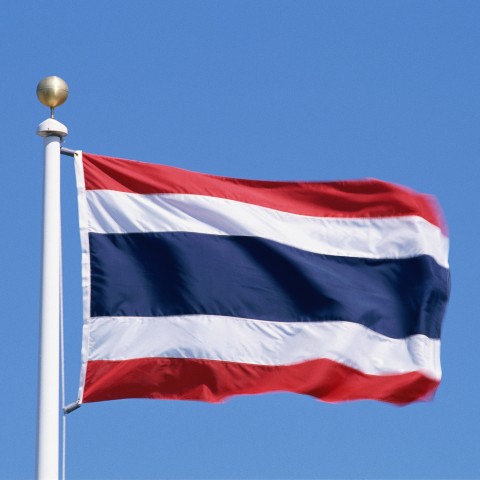












![How to ไหว้ [wâi]](https://wordlist.languagepod101.com/wordlist/media/25584&v=medium.jpg)


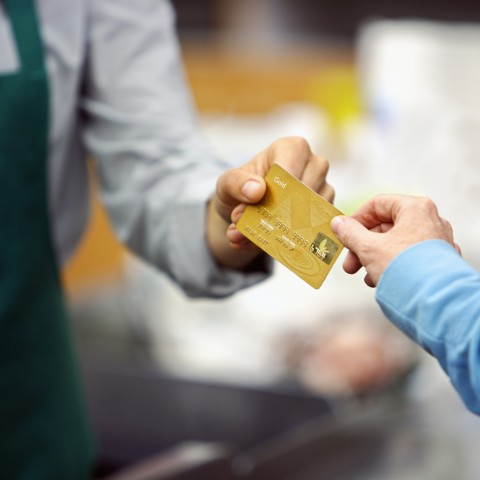






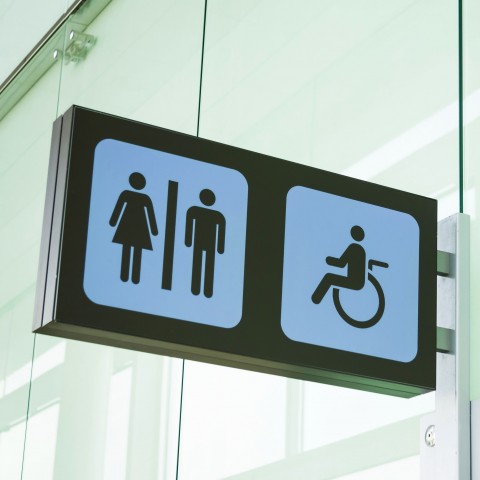







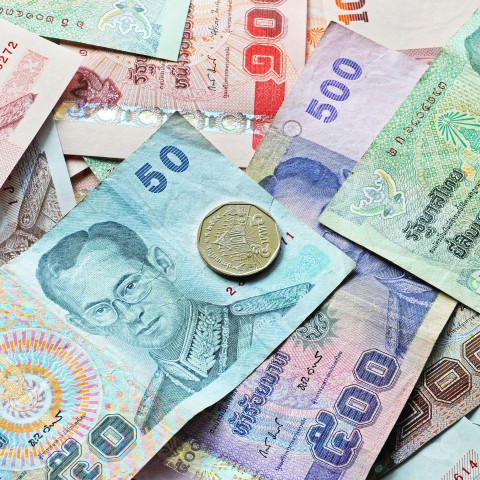





































![How Thai People ไหว้ [Wâi]](https://wordlist.languagepod101.com/wordlist/media/26168&v=medium.jpg)











